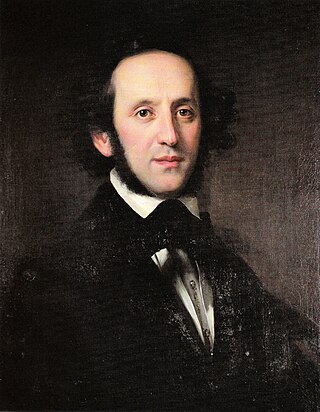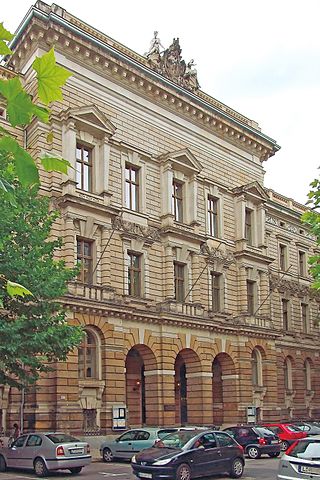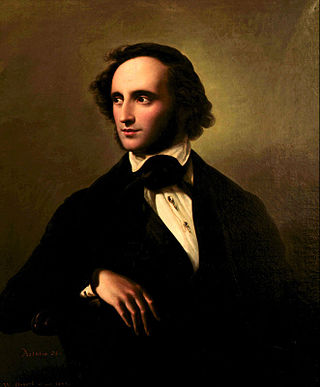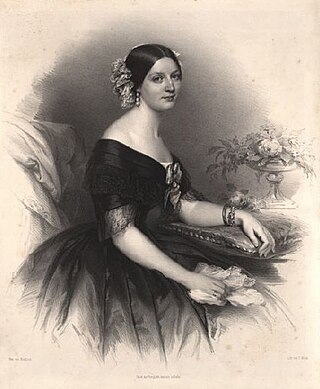
Jakob Ludwig Felix Mendelssohn Bartholdy, widely known as Felix Mendelssohn, was a German composer, pianist, organist and conductor of the early Romantic period. Mendelssohn's compositions include symphonies, concertos, piano music, organ music and chamber music. His best-known works include the overture and incidental music for A Midsummer Night's Dream, the Italian and Scottish Symphonies, the oratorios St. Paul and Elijah, the Hebrides Overture, the mature Violin Concerto, the String Octet, and the melody used in the Christmas carol "Hark! The Herald Angels Sing". Mendelssohn's Songs Without Words are his most famous solo piano compositions.

Felix Mendelssohn's Violin Concerto in E minor, Op. 64, MWV O 14, is his last concerto. Well received at its premiere, it has remained among the most prominent and highly-regarded violin concertos. It holds a central place in the violin repertoire and has developed a reputation as an essential concerto for all aspiring concert violinists to master, and usually one of the first Romantic era concertos they learn. A typical performance lasts just under half an hour.

The University of Music and Theatre "Felix Mendelssohn Bartholdy" Leipzig is a public university in Leipzig, Saxony, Germany. Founded in 1843 by Felix Mendelssohn as the Conservatorium der Musik, it is the oldest university school of music in Germany.

Ferdinand Ernst Victor Carl David was a German virtuoso violinist, composer and conductor.

The St. Thomas Church is a Lutheran church in Leipzig, Germany, located at the western part of the inner city ring road in Leipzig's central district. Martin Luther preached in the church in 1539. It is associated with several well-known composers, especially Johann Sebastian Bach, who was its Thomaskantor from 1723 until his death in 1750. The church holds his remains.

Gewandhaus is a concert hall in Leipzig, the home of the Leipzig Gewandhaus Orchestra. Today's hall is the third to bear this name; like the second, it is noted for its fine acoustics.

The String Quartet No. 6 in F minor, Op. 80 was composed by Felix Mendelssohn in 1847. It was the last major piece he completed before he died two months later, on 4 November 1847. It is believed he composed the piece as an homage to his sister Fanny, who died on 14 May of that year.

Psalm 42, Op. 42 Wie der Hirsch schreit is a cantata by Felix Mendelssohn, setting Psalm 42 in German. It was written and published in 1837 for soloists, mixed choir and orchestra.
The Mendelssohn Scholarship refers to two scholarships awarded in Germany and in the United Kingdom. Both commemorate the composer Felix Mendelssohn, and are awarded to promising young musicians to enable them to continue their development.

Mary Shaw was an English classical contralto who had an active international career in concerts and operas during the 1830s and 1840s. She is best remembered today for creating the role of Cuniza in the world premiere of Giuseppe Verdi's first opera Oberto at La Scala in 1839.

The Leipzig Gewandhaus Orchestra is a German symphony orchestra based in Leipzig, Germany. The orchestra is named after the concert hall in which it is based, the Gewandhaus. In addition to its concert duties, the orchestra also performs frequently in the Thomaskirche and as the official opera orchestra of the Leipzig Opera.

The Felix Mendelssohn Bartholdy Foundation is a not-for-profit independent foundation governed according to civil law. It is based in the Mendelssohn House in Leipzig.
Felix Mendelssohn (1809–1847) was a German composer.

Denn er hat seinen Engeln befohlen, MWV B 53, is the incipit of a motet for an eight-part choir a cappella by Felix Mendelssohn. He wrote it in 1844 for the Berlin Cathedral, setting verses 11 and 12 from Psalm 91. Later, Mendelssohn made the motet with accompaniment part of his oratorio Elijah. It was published in 1844, and by Breitkopf & Härtel in 1875 in the complete edition of the composer's works.
Karl Ottomar Treibmann was a German composer and music educator. From 1981 until his retirement in 2001, he was professor of music theory and Tonsatz at the Leipzig University. He was one of the representatives of modernity in the German Democratic Republic, whose great major works can be found in the areas of opera, symphony and chamber music.

Siegfried Thiele was a German composer. From 1990 to 1997, he was rector of the University of Music and Theatre Leipzig where he had begun teaching in 1962. He composed an extended work for soloists, choir and orchestra for the opening of the new Leipzig Gewandhaus in 1981, which was conducted by Kurt Masur.
Reinhard Pfundt is a German pianist, composer and academic teacher at the University of Music and Theatre Leipzig. He wrote orchestral works, chamber music and songs, and was awarded prizes in the German Democratic Republic (DDR).
Jürnjakob Timm is a German cellist and university lecturer. He played for over forty years in the Leipzig Gewandhaus Orchestra and the Gewandhaus Quartet.
Eleonore Henriette Magdalena Grabau-Bünau, also Henriette Grabau or Henriette Bünau, was a German operatic alto and mezzo-soprano. For twelve years she was the main singer at the Leipzig Gewandhaus and from 1843 to 1849 she was the first teacher at the Leipzig Conservatory.

Virginia Livia Frege, née Gerhardt was a German singer (soprano), Prima Donna of the Leipzig Stadttheater, arts patron and co-founder of the Leipzig Bach Society. She was referred to as the "Queen of Leipzig's romantic song singing". Frege is best known for her performances of the works by Felix Mendelssohn Bartholdy. Her repertoire included songs by Heinrich Marschner, Franz Schubert, Robert Schumann and Mendelssohn.














